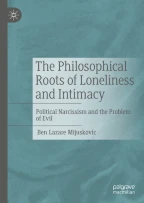Ethical Principles, Criteria, and the Meaning of Human Values

Loneliness and intimacy depend on value-laden life choices. The chapter focuses on ethics. Both Hume (an empiricist) and Kant (a rationalist) distinguish the Ought from the Is, Values from Facts, and Morality from Science. The author offers an exhaustive matrix of ethical principles and criteria in Western thought, from Relativism to Absolutism, available for the choosing. The deterministic sciences of psychology, behaviorism, neuroscience, sociology, and politics are incapable of dealing with human values. There is a variety of ethical first principles available for the choosing, including three forms of ethical relativism, Descriptive, Normative, and Metaethical. By contrast, there are four forms of ethical absolutism, grounded in Empiricism, Rationalism, Fideism, and Existentialism. And two forms of Existential principles: Theistic and Atheistic. Critical to the discussion, Freud, a determinist, is contrasted with the foregoing thinkers as he connects the ego’s sense of personal identity with narcissism and sadism as natural to man. But whether one chooses ethical relativism or absolutism, all these choices are value-laden. As William James contends, ethical choices are momentous, forced, and unavoidable, just as a man who delays forever whether to marry his sweetheart has in effect chosen not to marry. There are no agnostics. Science is the denial of values and idealism is its affirmation.
This is a preview of subscription content, log in via an institution to check access.
Access this chapter
Subscribe and save
Springer+ Basic
€32.70 /Month
- Get 10 units per month
- Download Article/Chapter or eBook
- 1 Unit = 1 Article or 1 Chapter
- Cancel anytime
Buy Now
Price includes VAT (France)
eBook EUR 85.59 Price includes VAT (France)
Softcover Book EUR 105.49 Price includes VAT (France)
Hardcover Book EUR 105.49 Price includes VAT (France)
Tax calculation will be finalised at checkout
Purchases are for personal use only
Notes
Cornford, F. M., Plato’s Theory of Knowledge: The Theaetetus and the Sophist of Plato (London: Percy, Lund, Humphrey’s & Co., 1964), 245E–246E; 228–232.
Bibliography
- Aristotle, Basic Works of Aristotle, edited by Richard Peter McKeon (New York: Random House, 1941). Google Scholar
- Augustine, Confessions Augustine, The Confessions of St. Augustine translated by Edward Pusey (New York: Collier-Macmillan). Google Scholar
- Camus, Albert, The Plague, Stuart Gilbert (New York: Random House, 1975). Google Scholar
- Dostoyevsky, Fyodor, The Brothers Karamazov, translated by Constance Garnet (New York: Random House, 1950). Google Scholar
- Ayer, A.J., Language Truth and Logic (New York: Dover, 1935), 104. Google Scholar
- Camus, Albert, The Plague, translated by Stuart Gilbert (New York: Random House, 1975). Google Scholar
- Cornford, F. M., Plato’s Theory of Knowledge: The Theaetetus and the Sophist of Plato (London: Percy, Lund, Humphrey’s & Co., 1964). Google Scholar
- Diagnostic and Statistical Manual of Mental Disorders, 4th ed. (Washington, D.C.: 1994). Google Scholar
- Epictetus, On the Nature of Things, The Stoic and Epicurean Philosophers, edited by Whitney J. Oates (New York: Modern Library, 1940). Google Scholar
- Garve, Christian, “Cicero De Officiis: The Microscope of Experience: Christina Garve’s Translation of Cicero’s De Officiis 1783,” Journal of the History of Ideas, 59:1 (1998). Google Scholar
- Hobbes, Thomas, Leviathan, or the Matter, Form, and Power of a Commonwealth Ecclesiastical and Civil, Chapter XIII (London: Collier, 1967). Google Scholar
- Hume, David, An Enquiry Concerning the Principles of Morals (Oxford: Clarendon Press, 1972). Google Scholar
- Hume, David, A Treatise of Human Nature (Oxford: Clarendon Press, 1955). Google Scholar
- Johnson, Oliver, ed., Ethics: Selections from Classical and Contemporary Writers, 7th ed. (Fort Worth, TX: Holt, Rinehart and Winston, 1994). Google Scholar
- Kant, Immanuel, “Fundamental Principles of the Metaphysic of Morals,” in Problems of Moral Philosophy: An Introduction to Moral Philosophy, 3rd ed. (Belmont, CA: Wadsworth Publishing, 1978). Google Scholar
- Kierkegaard, Soren, Fear and Trembling, translated by Alastair Hannay (London: Penguin, 1985). Google Scholar
- Moore, G. E., Principia Ethica (New York: Dover, 2004). Google Scholar
- Nietzsche, Friedrich, The Birth of Tragedy and The Case of Wagner, translated by Walter Kaufman (New York: Random House, 1967). Google Scholar
- Plato, Theaetetus, in Plato: The Collected Works, edited by Edith Hamilton and Huntington Cairns (New York: Pantheon, 1966). Google Scholar
- Ross, W. D. “Prima Facie Duties,” in Problems of Moral Philosophy: An Introduction to Moral Philosophy, 3rd ed. (Belmont, CA: Wadsworth Publishing, 1978). Google Scholar
- Sartre, Jean-Paul, “The Humanism of Existentialism,” translated by Bernard Frechtman, in Problems of Moral Philosophy: An Introduction to Moral Philosophy, 3rd ed. (Belmont, CA: Wadsworth Publishing, 1978). Google Scholar
- Schopenhauer, Arthur, The World as Will and Representation. Arthur Schopenhauer, The World as Will and Representation, translated by E. F. J. Payne (New York: Dover, 1969), I, Section 16). Google Scholar
- Stace, W. T. The Concept of Morals, in Problems of Moral Philosophy: An Introduction, edited by Paul Taylor (Belmont, CA: Wadsworth Publishing, 1978). Google Scholar
- Taylor, Paul, ed., Problems of Moral Philosophy: An Introduction to Moral Philosophy, 3rd ed. (Belmont, CA: Wadsworth Publishing, 1978). Google Scholar
Author information
Authors and Affiliations
- Philosophy, California State University Dominguez Hills, Carson, CA, USA Ben Lazare Mijuskovic
- Ben Lazare Mijuskovic

